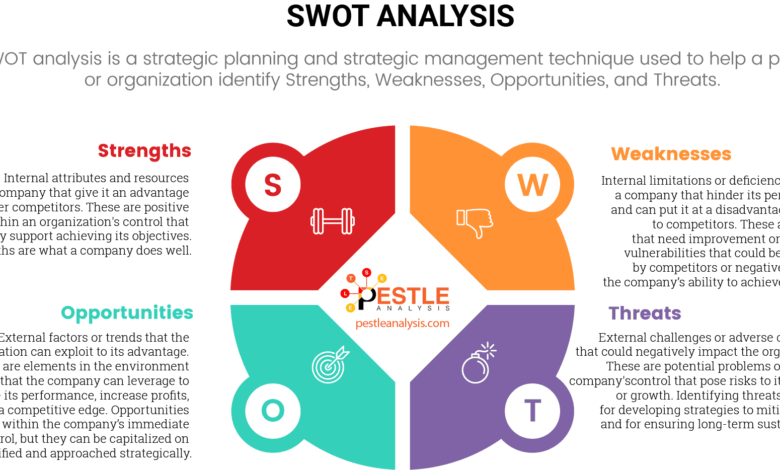SWOT analysis benefits: an essential tool for Bristol’s tech industry

In the competitive technology landscape, businesses in Bristol must adopt robust strategies to maintain their edge. One indispensable tool is SWOT analysis example. This strategic planning method is crucial for identifying a company’s strengths, weaknesses, opportunities, and threats, enabling tech firms to navigate the comReal-world swot analysis example for Lancaster businesses_ learn & implement _ 2024.docxplexities of their industry effectively.
Photo by Kaleidico on Unsplash
Given Bristol’s rapid growth in the tech sector, with the digital tech turnover reaching an impressive £8.1 billion in 2021, employing a SWOT analysis example is more relevant than ever. Let’s check out the significant benefits of SWOT analysis for tech companies in Bristol, offering insights into how they can harness this tool to drive growth and innovation.
What exactly is SWOT analysis?
A SWOT analysis is a straightforward but powerful framework. It involves listing a company’s internal strengths and weaknesses, along with external opportunities and threats. This comprehensive view helps businesses capitalise on their strengths, address weaknesses, seize new opportunities, and mitigate potential threats.
Strengths: building on what works
For Bristol’s tech companies, understanding and leveraging their strengths is crucial. The city is home to a burgeoning tech scene, with a vibrant community of startups and established firms. According to Tech Nation’s 2021 report, Bristol’s tech sector is one of the fastest-growing in the UK, contributing significantly to the local economy.
In fact, Bristol’s digital tech turnover was reported at £8.1 billion in 2021, showcasing its vital role in the regional economy. Recognising and building on strengths such as a skilled workforce, innovative culture, and strategic location can give businesses a competitive edge. The University of Bristol and the University of the West of England (UWE) are key providers of highly skilled graduates, fostering an environment rich in talent.
Weaknesses: identifying areas for improvement
No company is without its weaknesses, and acknowledging them is the first step towards improvement. For tech firms in Bristol, common weaknesses might include a shortage of specific skill sets, limited access to funding, or scalability challenges. For example, while the city boasts a high number of tech professionals, there is a notable skills gap in areas like cybersecurity and data analytics. By identifying these areas through a SWOT analysis, companies can surely develop targeted strategies to address them. For instance, investing in employee training programmes or seeking alternative funding sources can help mitigate these weaknesses. The UK government’s £1.9 billion investment in its National Cyber Security Strategy also highlights the importance of addressing such skill shortages.
Opportunities: new, endless possibilities
The tech industry is ripe with opportunities, and Bristol is no exception. The city’s continuously growing reputation as a tech hub attracts investment and talent, presenting numerous opportunities for local businesses. Additionally, the increasing demand for digital transformation across various sectors opens up new market possibilities.
According to the Office for National Statistics, the digital sector’s contribution to the UK economy grew by 7.9% in 2020. Furthermore, Bristol’s participation in the £10 million Smart City initiative, which aims to utilise technology to improve urban living, offers significant opportunities for tech companies to develop innovative solutions.
Threats: to navigate challenges
The tech landscape is fraught with potential threats, from rapid technological changes to intense competition. For Bristol-based tech companies, understanding these threats is vital for long-term success. Cybersecurity risks, regulatory changes, and economic fluctuations are some of the challenges that businesses might face.
A survey by the Cyber Security Breaches Survey 2021 found that 39% of businesses in the UK reported cyberattacks or breaches in the past 12 months, highlighting the critical nature of robust cybersecurity measures. A SWOT analysis helps companies anticipate these threats and develop strategies to counteract them.
Benefits of Swot analysis in the tech industry
The benefits of conducting a SWOT analysis extend beyond simply understanding the current state of a business. Here are some key advantages for tech companies in Bristol:
- Strategic planning: A SWOT analysis provides a solid foundation for strategic planning. By understanding internal and external factors, companies can set realistic goals and prepare effective strategies to achieve them.
- Enhanced decision-making: With a clear understanding of strengths, weaknesses, opportunities, and threats, business leaders can make more informed decisions. This leads to better resource allocation and prioritisation.
- Competitive advantage: By identifying unique strengths and opportunities, tech firms can differentiate themselves from competitors. This is particularly important in Bristol’s competitive tech landscape.
- Risk management: Anticipating potential threats allows companies to develop contingency plans. This proactive approach for risk management safeguards the business against unforeseen challenges.
- Improved performance: Regular SWOT analyses can lead to continuous improvement. By addressing weaknesses and seizing opportunities, tech companies will enhance their overall performance and drive growth.
Conclusion
For tech companies in Bristol, a SWOT analysis is an invaluable instrument that offers numerous benefits. From strategic planning and enhanced decision-making to gaining a competitive advantage and improving performance, the insights gained from a SWOT analysis can be transformative.



